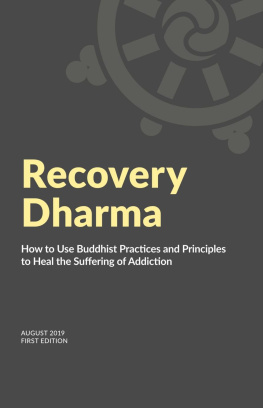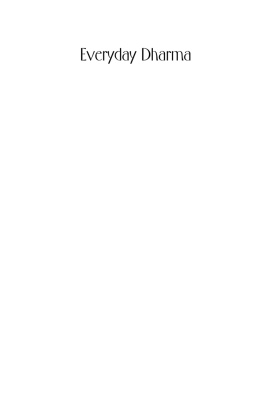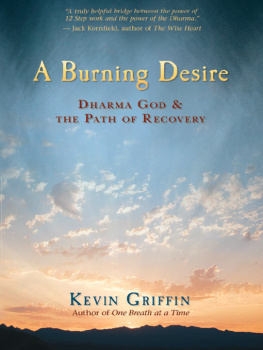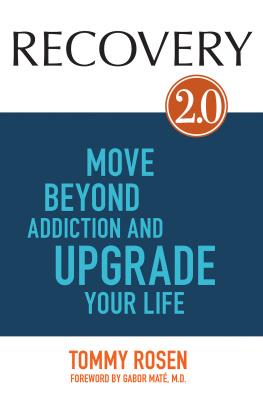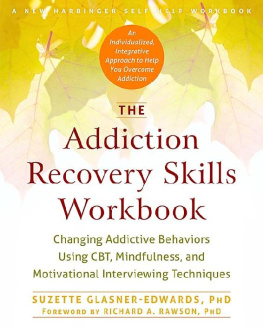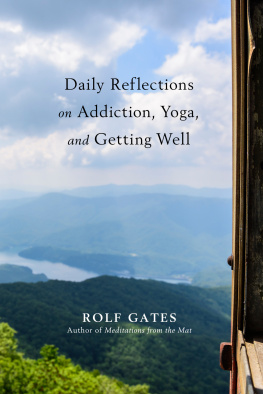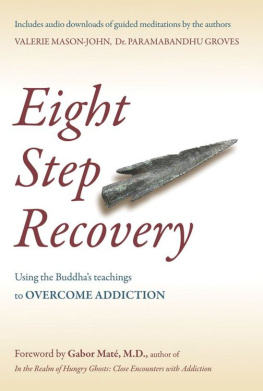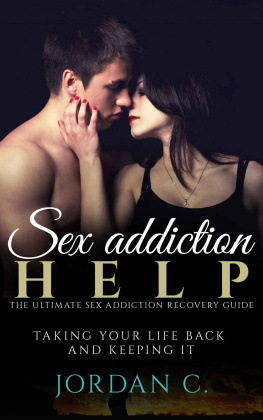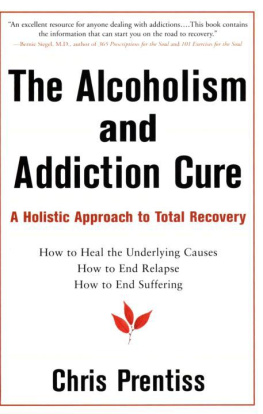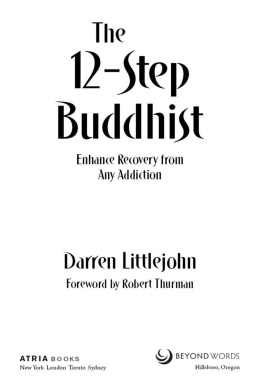Once we make a decision to recover from addictionto substances, habits, people, whateverit can be scary. The feeling is often one of loss and loneliness, because recovery can shake our sense of identity, our idea of who we are. Who will I be if I let my addiction go? Change can be hard to face, even if we know were letting go of something thats a danger to us. For many of us, the first and most significant challenge was finding a safe and stable place to begin healing.
This is a book about using Buddhist practices and principles to recover from addiction, but you dont need to become a Buddhist to benefit from this program. One of the most revolutionary things the Buddha taught was that the mind is not only the source of great sufferingdue to craving, greed, anger, and confusionbut the cure for that suffering as well. So what were doing is using an ancient, proven way to literally change our minds. And were choosing to trust in our own potential for wisdom and compassion for others and ourselves.
What you have in your hands is a collaboration from many members of our community. Its intended to be a friendly guide for those new to this path as well as long-term practitioners. Its structured around what are sometimes called the three jewels of Buddhism: the Buddha (the potential for our own awakening and the goal of the path), the Dharma (how we get there), and the Sangha (who we travel with). Well share how we have used this program to recover from addiction and the ways weve made it our own: not as a one-size-fits-all approach, but as a dynamic set of tools and techniques that anyone can use to find relief from the suffering of addiction.
WHAT IS RECOVERY
DHARMA?
The word dharma doesnt have a single English meaning. Its a word in an ancient language called Sanskrit, and it can be translated as truth, phenomena, or the nature of things. When its capitalized, the word Dharma usually means the teachings of the Buddha and the practices based on those teachings.
The Buddha knew that all human beings, to one degree or another, struggle with cravingthe powerful, sometimes blinding desire to change our thoughts, feelings, and circumstances. Those of us who experience addiction have been more driven to use substances or behaviors to do this, but the underlying craving is the same. And even though the Buddha didnt talk specifically about addiction, he understood the obsessive nature of the human mind. He understood our attachment to pleasure and aversion to pain. He understood the extreme lengths we can sometimes go to, chasing what we want to feel and running away from the feelings we fear. And he found a solution.
This book describes a way to free ourselves from the suffering of addiction using Buddhist practices and principles. This program leads to recovery from addiction to substances like alcohol and drugs, and also from what we refer to as process addictions . We can also become addicted to sex, gambling, technology, work, codependence, shopping, food, media, self-harm, lying, stealing, obsessive worrying. This is a path to freedom from any repetitive and habitual behavior that causes suffering.
Many of us who have found our way here might be new to Buddhism. There are unfamiliar words, concepts, and ways of looking at the world. It can be intimidating and uncomfortable to sit in a meeting with people throwing around words like karma, Dharma, Sangha, and Buddha. If you have felt this way, youre not alone. The purpose of this book is to lay out our path and practice in a clear and simple way that can be of use to people who are brand new to recovery and to Buddhism, as well as those with some experience. It describes the original Buddhist teachings to show where our program comes from. It introduces the essence of Buddhisms basic teachingsthe Four Noble Truthsin a way that shows how practicing the Eightfold Path is a pragmatic tool-kit for dealing with the challenges of both early and long-term recovery.
This is a renunciation-based program. Regardless of the type of addiction we identify with, all of our members commit to a basic abstinence from the substance or behavior of our addiction. For those of us whose addictions involve things like food and technology from which complete abstinence may not be possible, renunciation will mean something different, based on thoughtful boundaries and intentions in our behaviors. For some of us, abstinence from things like obsessive sexual behavior or compulsively seeking out love and relationships may be necessary as we work to understand and find meaningful boundaries. Many of us have found that after renouncing our primary addiction for a period of time, other harmful behaviors and process addictions become apparent in our lives. But rather than getting discouraged, we found that we can also meet these behaviors with compassion and patient investigation. We believe recovery is a lifelong, holistic process of peeling back layers of habits and conditioned behaviors to find our own, sometimes hidden, potential for awakening.
Our program is peer-led: we dont follow any one teacher or leader. We support each other as partners walking the path of recovery together. This is not a program based in dogma or religion, but in finding the truth for ourselves. This is wisdom that has worked for us, but it is not the only path. Its fully compatible with other spiritual paths and programs of recovery. We know from our own experience that true recovery is only possible with the intention of radical honesty, understanding, awareness, and integrity, and we trust you to discover your own path. We believe this program can help you do just that.
Ours is a program that asks us to never stop growing. It asks us to own our choices and be responsible for our own healing. Its based on kindness, generosity, forgiveness, and deep compassion. We do not rely on tools of shame and fear as motivation. We know these havent worked in our own individual pasts, and have often created more struggle and suffering through relapse and discouragement. The courage it takes to recover from addiction is ultimately courage of the heart, and we aim to support each other as we commit to this brave work.
Many of us have spent our lives beating ourselves up. In this program, we renounce violence and doing harm, including the harm and violence we do to ourselves. We believe in the healing power of forgiveness. We put our trust in our own potential to awaken and recover, in the Four Noble Truths of the Buddha, and in the people we meet and connect with in meetings and throughout our journey in recovery.

